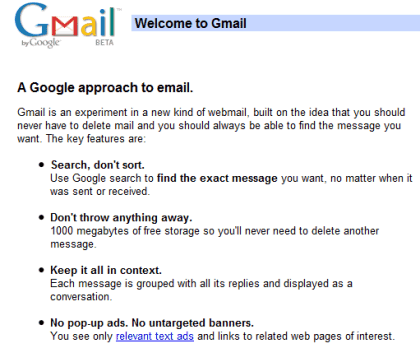We starting working on Gmail in August (or September?) 2001. For a long time, almost everyone disliked it. Some people used it anyway because of the search, but they had endless complaints. Quite a few people thought that we should kill the project, or perhaps "reboot" it as an enterprise product with native client software, not this crazy Javascript stuff. Even when we got to the point of launching it on April 1, 2004 (two and a half years after starting work on it), many people inside of Google were predicting doom. The product was too weird, and nobody wants to change email services. I was told that we would never get a million users.
Once we launched, the response was surprisingly positive, except from the people who hated it for a variety of reasons. Nevertheless, it was frequently described as "niche", and "not used by real people outside of silicon valley".
Financial Times reports that Gmail has about 100 million users and the growth rate is still significant: "[Gmail] has been gaining ground in the US over the past year, with users growing by more than 40 per cent, compared to 2 per cent for Yahoo and a 7 per cent fall in users of Microsoft's webmail."
Even though the competing mail services improved their offerings and storage is no longer an important differentiator, Gmail still offers an unmatched user experience. After using Gmail, you'll no longer understand why Yahoo Mail places the "Send button" above the message, why Yahoo Mail thinks it's more important to show news and weather information instead of your inbox, why Yahoo Mail still charges for features that are available for free in Gmail, why Hotmail shows a large banner at the top of the page or why you can't auto-forward mail to a non-Hotmail account. Gmail made so many right choices that it's easy to ignore some of its quirks, downtimes or bugs.
As David Pogue said back in 2004, "Even in its current, early state, available only to a few thousand testers, Gmail appears destined to become one of the most useful Internet services since Google itself. Gmail is infinitely cleaner, faster, more useful, more efficient, less commercial and less limiting than other Web-based e-mail services."
The perception about Gmail changed a lot over the years, even though Gmail didn't remove controversial features like contextual ads or conversations. From the paranoid "Google reads your mail" or the cool factor of having a Gmail invite, Gmail became successful by continuing to improve and to exceed people's expectations.

Gmail's homepage from 2004